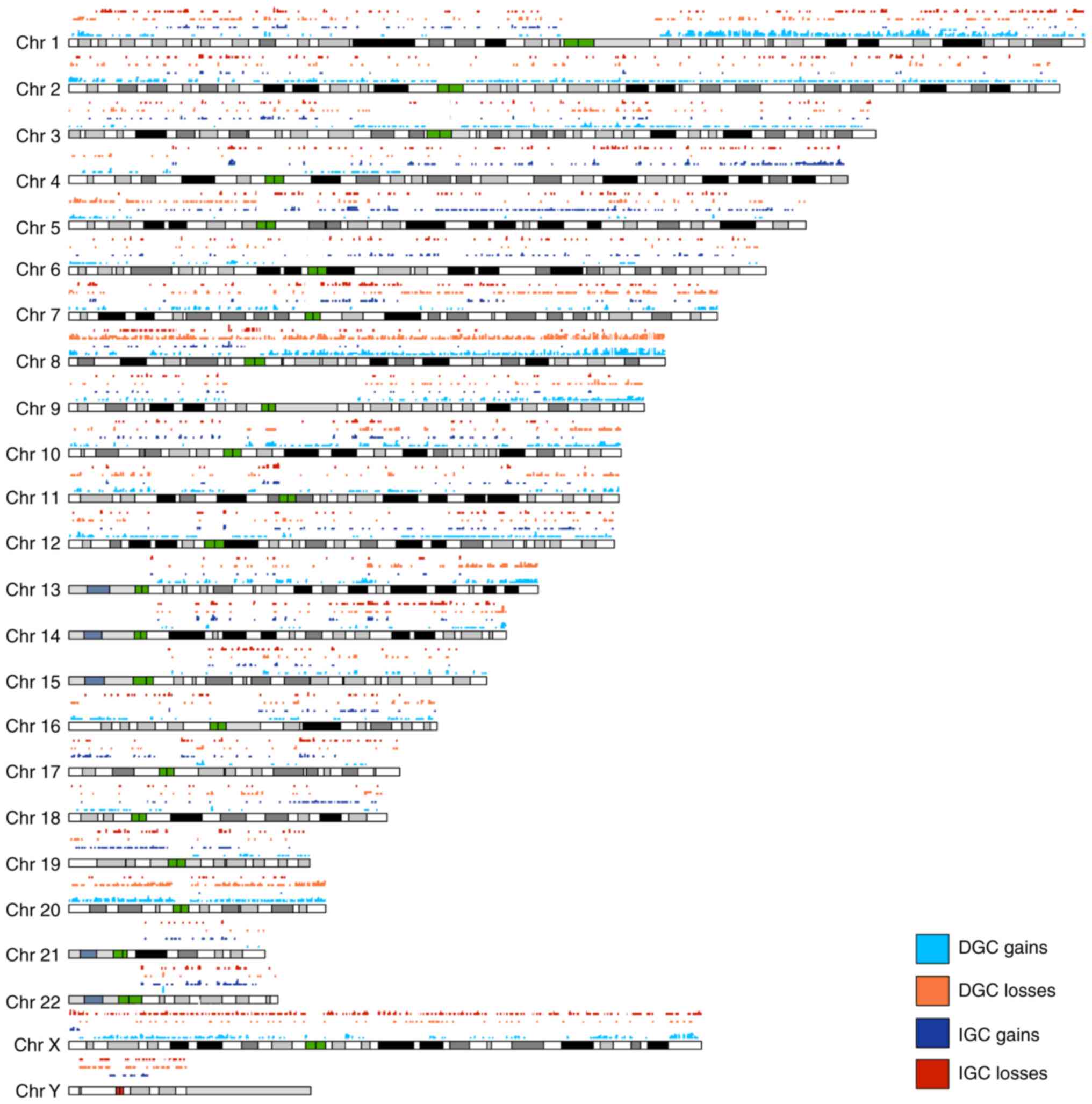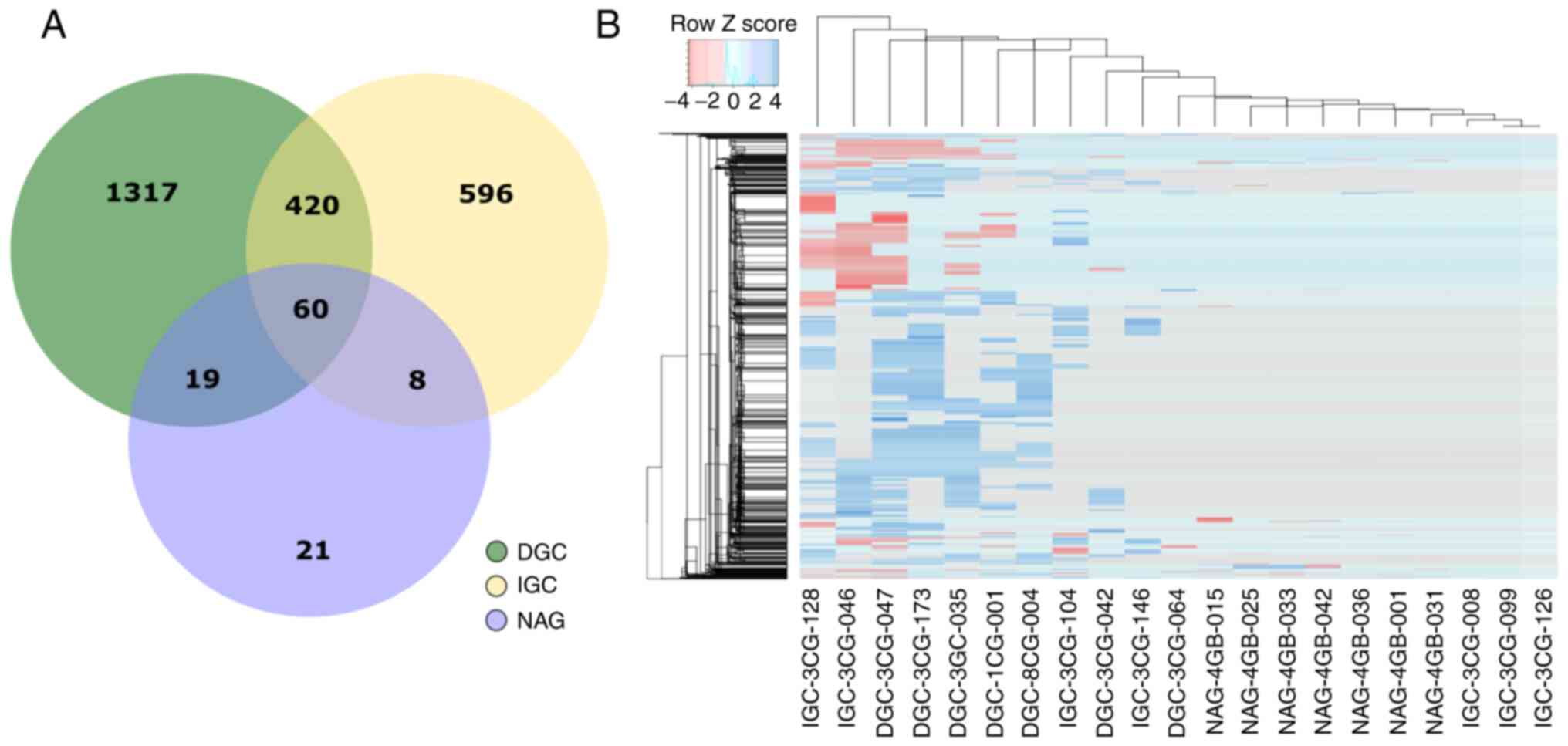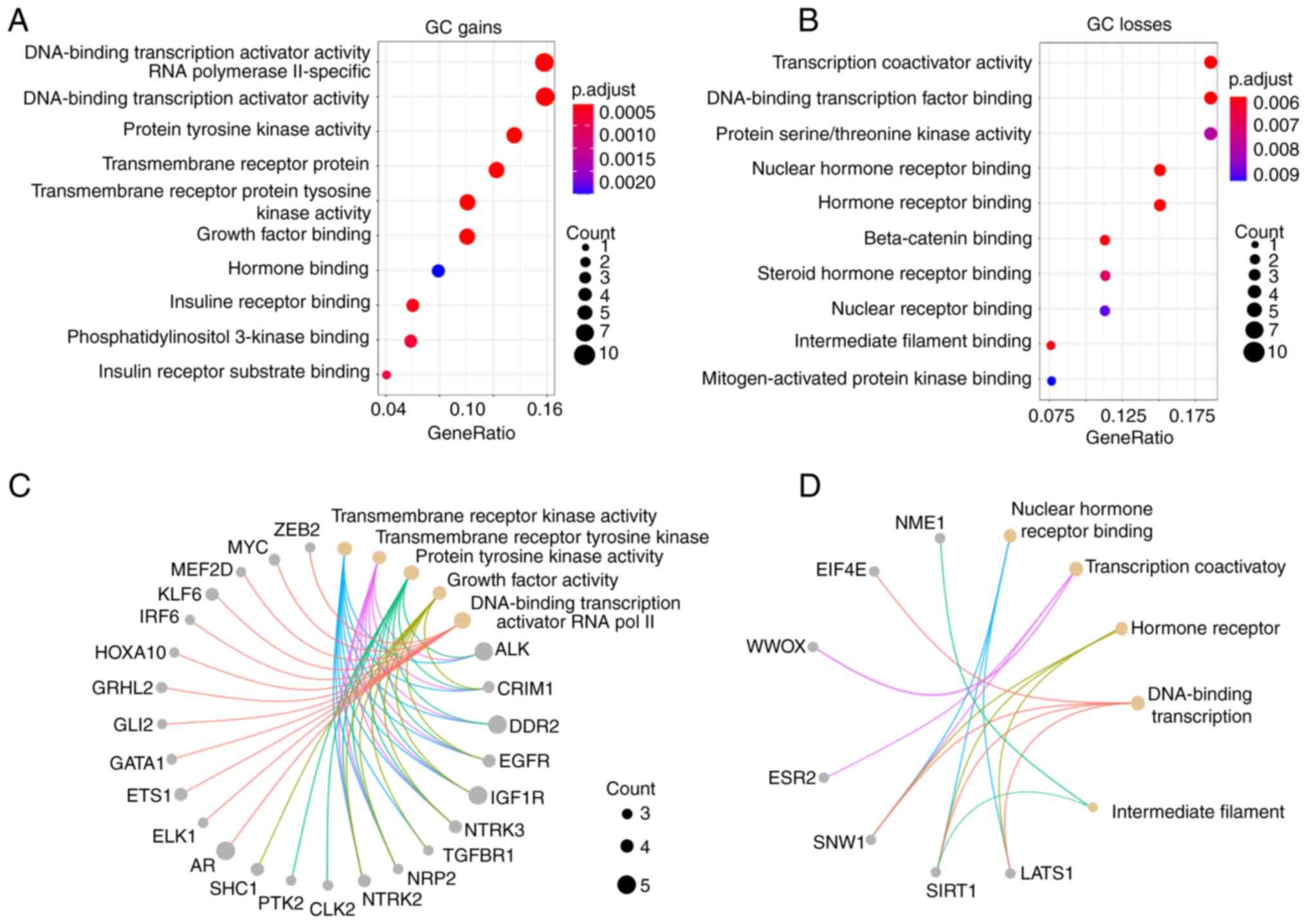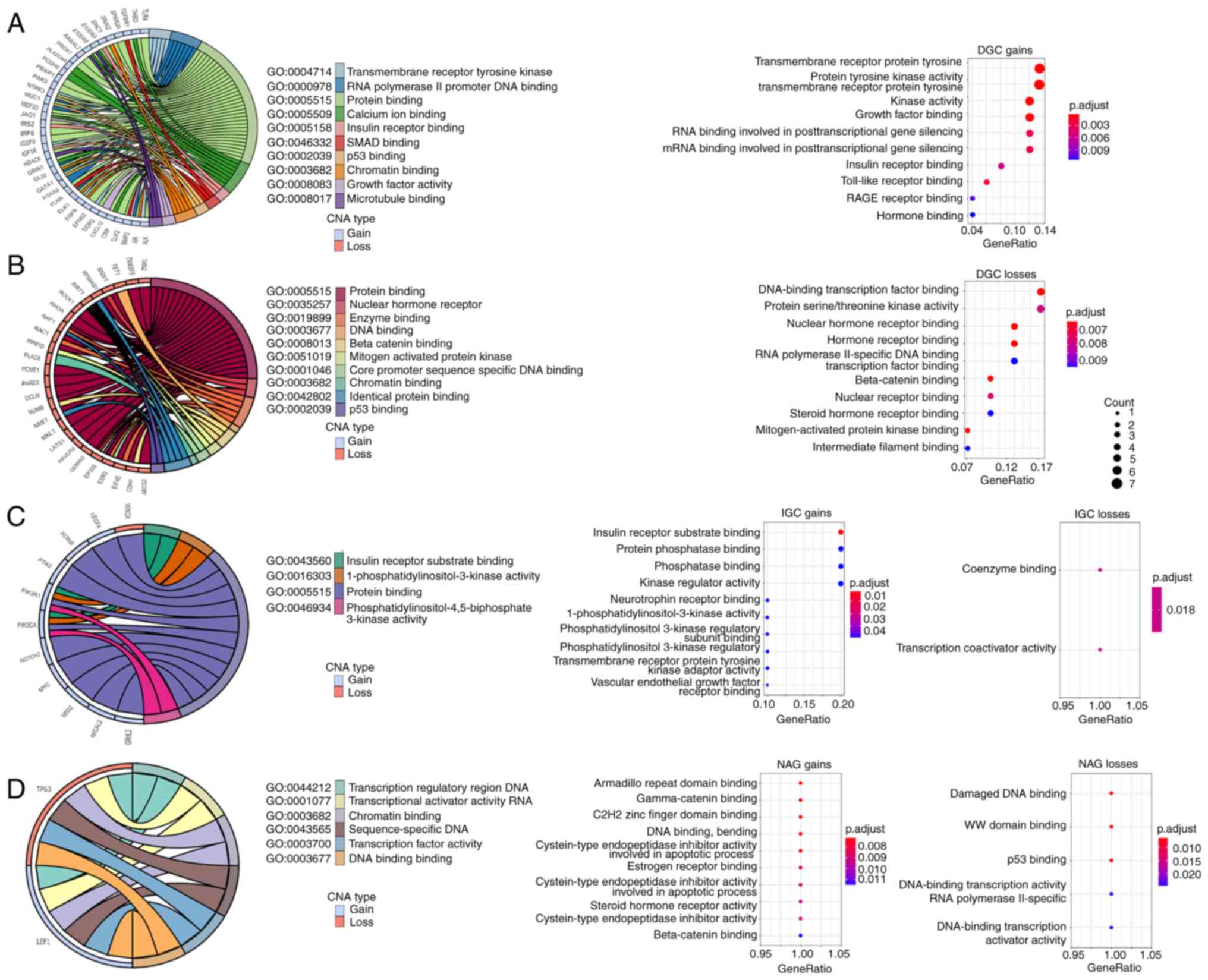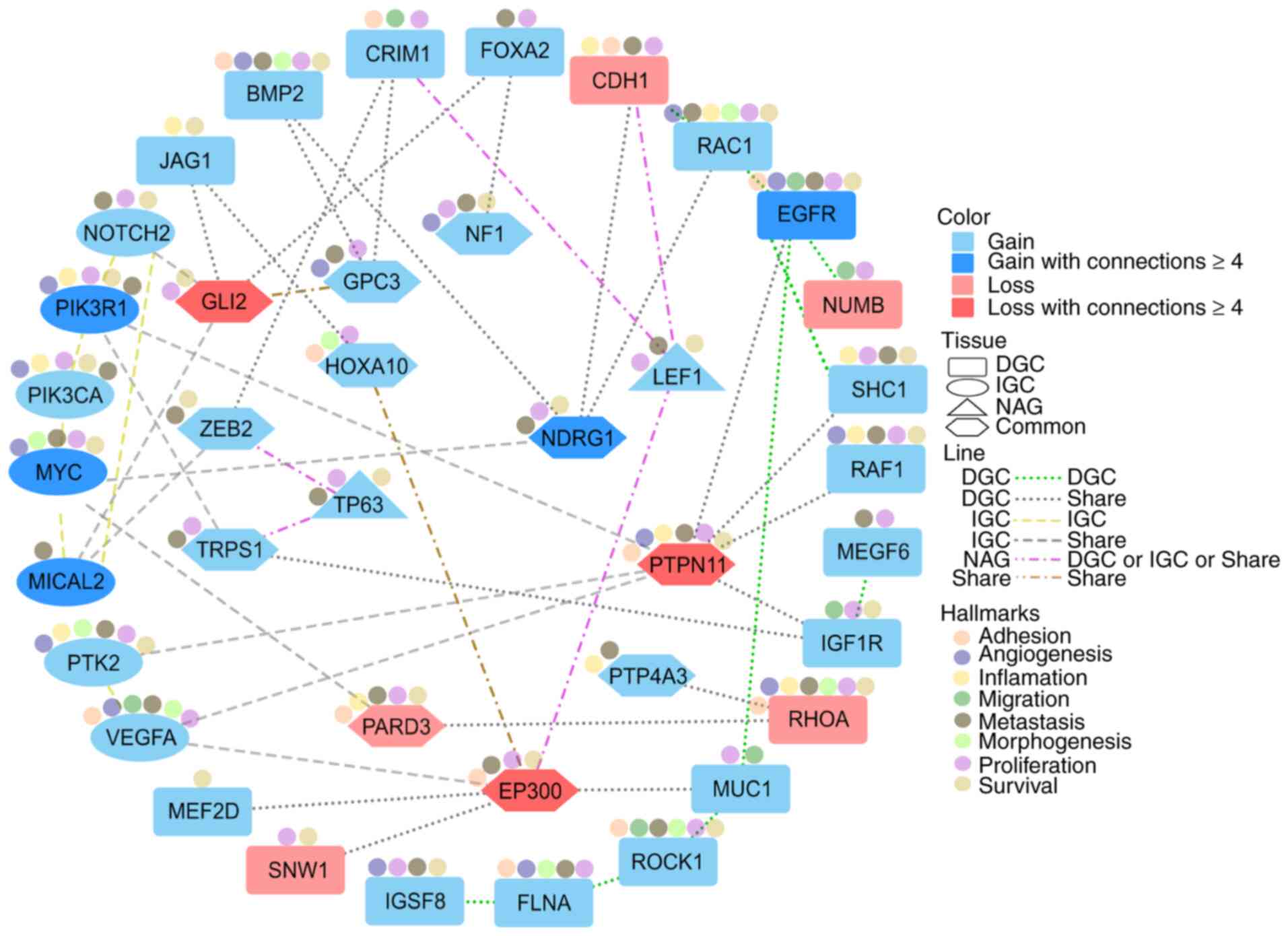|
1
|
Sung H, Ferlay J, Siegel RL, Laversanne M,
Soerjomataram I, Jemal A and Bray F: Global cancer statistics 2020:
GLOBOCAN estimates of incidence and mortality worldwide for 36
cancers in 185 countries. CA Cancer J Clin. 71:209–249. 2021.
View Article : Google Scholar : PubMed/NCBI
|
|
2
|
INEGI-Social Communication, . Statistics
on World Cancer Day (February 4)-National Data. INEGI. 2018.
|
|
3
|
Lauren P: The two histological main types
of gastric carcinoma: Diffuse and so-called intestinal-type
carcinoma: An attempt at a histo-clinical classification. Acta
Pathol Microbiol Scand. 64:31–49. 1965. View Article : Google Scholar : PubMed/NCBI
|
|
4
|
Espejo Romero H and Navarrete Siancas J:
Classification of stomach adenocarcinomas. Rev Gastroenterol Peru.
23:199–212. 2003.(In Spanish). PubMed/NCBI
|
|
5
|
Piazuelo MB, Epplein M and Correa P:
Gastric cancer: An infectious disease. Infect Dis Clin North Am.
24853–869. (VII)2010. View Article : Google Scholar : PubMed/NCBI
|
|
6
|
Nagini S: Carcinoma of the stomach: A
review of epidemiology, pathogenesis, molecular genetics and
chemoprevention. World J Gastrointest Oncol. 4:156–169. 2012.
View Article : Google Scholar : PubMed/NCBI
|
|
7
|
McLean MH and El-Omar EM: Genetics of
gastric cancer. Nat Rev Gastroenterol Hepatol. 11:664–674. 2014.
View Article : Google Scholar : PubMed/NCBI
|
|
8
|
Mikhail FM, Biegel JA, Cooley LD, Dubuc
AM, Hirsch B, Horner VL, Newman S, Shao L, Wolff DJ and Raca G:
Technical laboratory standards for interpretation and reporting of
acquired copy-number abnormalities and copy-neutral loss of
heterozygosity in neoplastic disorders: A joint consensus
recommendation from the American College of Medical Genetics and
Genomics (ACMG) and the Cancer Genomics Consortium (CGC). Genet
Med. 21:1903–1916. 2019. View Article : Google Scholar : PubMed/NCBI
|
|
9
|
Wallander K, Eisfeldt J, Lindblad M,
Nilsson D, Billiau K, Foroughi H, Nordenskjöld M, Liedén A and Tham
E: Cell-free tumour DNA analysis detects copy number alterations in
gastro-oesophageal cancer patients. PLoS One. 16:e02454882021.
View Article : Google Scholar : PubMed/NCBI
|
|
10
|
Han B, Ren D, Mao B, Song X, Yang W, Zhang
H and Gao F: Tumor copy number alteration (CNA) burden as a
prognostic factor for overall survival in Chinese gastric cancers.
J Clin Oncol. 37 (Suppl 15):e155552019. View Article : Google Scholar
|
|
11
|
Milne AN: Early-onset gastric cancer:
Learning lessons from the young. World J Gastrointest Oncol.
2:59–64. 2010. View Article : Google Scholar : PubMed/NCBI
|
|
12
|
Iafrate AJ, Feuk L, Rivera MN, Listewnik
ML, Donahoe PK, Qi Y, Scherer SW and Lee C: Detection of
large-scale variation in the human genome. Nat Genet. 36:949–951.
2004. View
Article : Google Scholar : PubMed/NCBI
|
|
13
|
Seabra AD, Araújo TM, Mello Junior FA, Di
Felipe Ávila Alcântara D, De Barros AP, De Assumpção PP, Montenegro
RC, Guimarães AC, Demachki S, Burbano RM and Khayat AS:
High-density array comparative genomic hybridization detects novel
copy number alterations in gastric adenocarcinoma. Anticancer Res.
34:6405–6415. 2014.PubMed/NCBI
|
|
14
|
Morales-Guerrero SE, Rivas-Ortiz CI, Ponce
de León-Rosales S, Gamboa-Domínguez A, Rangel-Escareño C,
Uscanga-Domínguez LF, Aguilar-Gutiérrez GR,
Kershenobich-Stalnikowitz D, Castillo-Rojas G and López-Vidal Y:
Translation of gastric disease progression at gene level
expression. J Cancer. 11:520–532. 2020. View Article : Google Scholar : PubMed/NCBI
|
|
15
|
Nadauld LD, Garcia S, Natsoulis G, Bell
JM, Miotke L, Hopmans ES, Xu H, Pai RK, Palm C, Regan JF, et al:
Metastatic tumor evolution and organoid modeling implicate TGFBR2
as a cancer driver in diffuse gastric cancer. Genome Biol.
15:4282014. View Article : Google Scholar : PubMed/NCBI
|
|
16
|
Vasaikar SV, Deshmukh AP, den Hollander P,
Addanki S, Kuburich NA, Kudaravalli S, Joseph R, Chang JT,
Soundararajan R and Mani SA: EMTome: A resource for pan-cancer
analysis of epithelial-mesenchymal transition genes and signatures.
Br J Cancer. 124:259–269. 2021. View Article : Google Scholar : PubMed/NCBI
|
|
17
|
Varga J and Greten FR: Cell plasticity in
epithelial homeostasis and tumorigenesis. Nat Cell Biol.
19:1133–1141. 2017. View
Article : Google Scholar : PubMed/NCBI
|
|
18
|
Kalluri R and Weinberg RA: The basics of
epithelial-mesenchymal transition. J Clin Invest. 119:1420–1428.
2009. View
Article : Google Scholar : PubMed/NCBI
|
|
19
|
Christofori G: New signals from the
invasive front. Nature. 441:444–450. 2006. View Article : Google Scholar : PubMed/NCBI
|
|
20
|
Murai T, Yamada S, Fuchs BC, Fujii T,
Nakayama G, Sugimoto H, Koike M, Fujiwara M, Tanabe KK and Kodera
Y: Epithelial-to-mesenchymal transition predicts prognosis in
clinical gastric cancer: EMT in clinical gastric cancer. J Surg
Oncol. 109:684–689. 2014. View Article : Google Scholar : PubMed/NCBI
|
|
21
|
Xia P and Xu XY: Epithelial-mesenchymal
transition and gastric cancer stem cell. Tumour Biol.
39:10104283176983732017. View Article : Google Scholar : PubMed/NCBI
|
|
22
|
Wang G and Anastassiou D: Pan-cancer
driver copy number alterations identified by joint expression/CNA
data analysis. Sci Rep. 10:171992020. View Article : Google Scholar : PubMed/NCBI
|
|
23
|
Owen GI, Pinto MP, Retamal IN, Fernádez
MF, Cisternas B, Mondaca S, Sanchez C, Galindo H, Nervi B, Ibañez
C, et al: Chilean gastric cancer task force: A study protocol to
obtain a clinical and molecular classification of a cohort of
gastric cancer patients. Medicine (Baltimore). 97:e04192018.
View Article : Google Scholar : PubMed/NCBI
|
|
24
|
Araújo TM, Seabra AD, Lima EM, Assumpção
PP, Montenegro RC, Demachki S, Burbano RM and Khayat AS: Recurrent
amplification of RTEL1 and ABCA13 and its synergistic effect
associated with clinicopathological data of gastric adenocarcinoma.
Mol Cytogenet. 9:522016. View Article : Google Scholar : PubMed/NCBI
|
|
25
|
Eltoum I, Fredenburgh J, Myers RB and
Grizzle WE: Introduction to the theory and practice of fixation of
tissues. J Histotechnol. 24:173–190. 2001. View Article : Google Scholar
|
|
26
|
Fischer I, Cunliffe C, Bollo RJ, Weiner
HL, Devinsky O, Ruiz-Tachiquin ME, Venuto T, Pearlman A, Chiriboga
L, Schneider RJ, et al: Glioma-like proliferation within tissues
excised as tubers in patients with tuberous sclerosis complex. Acta
Neuropathol. 116:67–77. 2008. View Article : Google Scholar : PubMed/NCBI
|
|
27
|
Utrera-Barillas D, Valdez-Salazar HA,
Gómez-Rangel D, Alvarado-Cabrero I, Aguilera P, Gómez-Delgado A and
Ruiz-Tachiquin ME: Is human cytomegalovirus associated with breast
cancer progression? Infect Agent Cancer. 8:122013. View Article : Google Scholar : PubMed/NCBI
|
|
28
|
Hanahan D and Weinberg RA: Hallmarks of
cancer: The next generation. Cell. 144:646–674. 2011. View Article : Google Scholar : PubMed/NCBI
|
|
29
|
Jeon J and Cheong JH: Clinical
implementation of precision medicine in gastric cancer. J Gastric
Cancer. 19:235–253. 2019. View Article : Google Scholar : PubMed/NCBI
|
|
30
|
Zubarayev M, Min EK and Son T: Clinical
and molecular prognostic markers of survival after surgery for
gastric cancer: Tumor-node-metastasis staging system and beyond.
Transl Gastroenterol Hepatol. 4:592019. View Article : Google Scholar : PubMed/NCBI
|
|
31
|
Brierley JD, Gospodarowicz MK and
Wittekind C: TNM Classification of Malignant Tumours: Edition 8.
John Wiley & Sons; New Jersey: pp. 1–16. 2016, PubMed/NCBI
|
|
32
|
Bure IV, Nemtsova MV and Zaletaev DV:
Roles of E-cadherin and noncoding RNAs in the
epithelial-mesenchymal transition and progression in gastric
cancer. Int J Mol Sci. 20:28702019. View Article : Google Scholar : PubMed/NCBI
|
|
33
|
Marin JJG, Perez-Silva L, Macias RIR,
Asensio M, Peleteiro-Vigil A, Sanchez-Martin A, Cives-Losada C,
Sanchon-Sanchez P, Sanchez De Blas B, Herraez E, et al: Molecular
bases of mechanisms accounting for drug resistance in gastric
adenocarcinoma. Cancers (Basel). 12:21162020. View Article : Google Scholar : PubMed/NCBI
|
|
34
|
De Las Rivas J, Brozovic A, Izraely S,
Casas-Pais A, Witz IP and Figueroa A: Cancer drug resistance
induced by EMT: Novel therapeutic strategies. Arch Toxicol.
95:2279–2297. 2021. View Article : Google Scholar : PubMed/NCBI
|
|
35
|
Zhao M, Liu Y and Qu H: Expression of
epithelial-mesenchymal transition-related genes increases with copy
number in multiple cancer types. Oncotarget. 7:24688–24699. 2016.
View Article : Google Scholar : PubMed/NCBI
|
|
36
|
Wee Y, Wang T, Liu Y, Li X and Zhao M: A
pan-cancer study of copy number gain and up-regulation in human
oncogenes. Life Sci. 211:206–214. 2018. View Article : Google Scholar : PubMed/NCBI
|
|
37
|
Zhao M and Zhao Z: Concordance of copy
number loss and down-regulation of tumor suppressor genes: A
pan-cancer study. BMC Genomics. 17 Suppl 7(Suppl 7):5322016.
View Article : Google Scholar : PubMed/NCBI
|
|
38
|
Tong Y, Tang Y, Li S, Zhao F, Ying J, Qu
Y, Niu X and Mu D: Cumulative evidence of relationships between
multiple variants in 8q24 region and cancer incidence. Medicine
(Baltimore). 99:e207162020. View Article : Google Scholar : PubMed/NCBI
|
|
39
|
Arakawa N, Sugai T, Habano W, Eizuka M,
Sugimoto R, Akasaka R, Toya Y, Yamamoto E, Koeda K, Sasaki A, et
al: Genome-wide analysis of DNA copy number alterations in early
and advanced gastric cancers. Mol Carcinog. 56:527–537. 2017.
View Article : Google Scholar : PubMed/NCBI
|
|
40
|
Anauate AC, Leal MF, Wisnieski F, Santos
LC, Gigek CO, Chen ES, Calcagno DQ, Assumpção PP, Demachki S,
Arasaki CH, et al: Analysis of 8q24.21 miRNA cluster expression and
copy number variation in gastric cancer. Future Med Chem.
11:947–958. 2019. View Article : Google Scholar : PubMed/NCBI
|
|
41
|
Labrador L, Torres K, Camargo M, Santiago
L, Valderrama E and Chiurillo MA: Association of common variants on
chromosome 8q24 with gastric cancer in Venezuelan patients. Gene.
566:120–124. 2015. View Article : Google Scholar : PubMed/NCBI
|
|
42
|
Jin DH, Park SE, Lee J, Kim KM, Kim S, Kim
DH and Park J: Copy number gains at 8q24 and 20q11-q13 in gastric
cancer are more common in intestinal-type than diffuse-type. PLoS
One. 10:e01376572015. View Article : Google Scholar : PubMed/NCBI
|
|
43
|
Korivi BR, Faria S, Aly A, Sun J, Patnana
M, Jensen CT, Wagner-Bartak N and Bhosale PR: Intestinal and
diffuse gastric cancer: A retrospective study comparing primary
sites. Clin Imaging. 56:33–40. 2019. View Article : Google Scholar : PubMed/NCBI
|
|
44
|
Cancer Genome Atlas Research Network, .
Comprehensive molecular characterization of gastric adenocarcinoma.
Nature. 513:202–209. 2014. View Article : Google Scholar : PubMed/NCBI
|
|
45
|
Qin H, Ni H, Liu Y, Yuan Y, Xi T, Li X and
Zheng L: RNA-binding proteins in tumor progression. J Hematol
Oncol. 13:902020. View Article : Google Scholar : PubMed/NCBI
|
|
46
|
Morgan MA and Shilatifard A: Chromatin
signatures of cancer. Genes Dev. 29:238–249. 2015. View Article : Google Scholar : PubMed/NCBI
|
|
47
|
Brabletz T, Kalluri R, Nieto MA and
Weinberg RA: EMT in cancer. Nat Rev Cancer. 18:128–134. 2018.
View Article : Google Scholar : PubMed/NCBI
|
|
48
|
Bhullar KS, Lagarón NO, McGowan EM, Parmar
I, Jha A, Hubbard BP and Rupasinghe HPV: Kinase-targeted cancer
therapies: Progress, challenges and future directions. Mol Cancer.
17:482018. View Article : Google Scholar : PubMed/NCBI
|
|
49
|
Olea-Flores M, Zuñiga-Eulogio MD,
Mendoza-Catalán MA, Rodríguez-Ruiz HA, Castañeda-Saucedo E,
Ortuño-Pineda C, Padilla-Benavides T and Navarro-Tito N:
Extracellular-signal regulated kinase: A central molecule driving
epithelial-mesenchymal transition in cancer. Int J Mol Sci.
20:28852019. View Article : Google Scholar : PubMed/NCBI
|
|
50
|
Castel P, Toska E, Engelman JA and
Scaltriti M: The present and future of PI3K inhibitors for cancer
therapy. Nat Cancer. 2:587–597. 2021. View Article : Google Scholar : PubMed/NCBI
|
|
51
|
Zhang Y, Kwok-Shing Ng P, Kucherlapati M,
Chen F, Liu Y, Tsang YH, de Velasco G, Jeong KJ, Akbani R,
Hadjipanayis A, et al: A pan-cancer proteogenomic atlas of
PI3K/AKT/mTOR pathway alterations. Cancer Cell. 31:820–832.e3.
2017. View Article : Google Scholar : PubMed/NCBI
|
|
52
|
Assumpção PP, Barra WF, Ishak G, Coelho
LGV, Coimbra FJF, Freitas HC, Dias-Neto E, Camargo MC and Szklo M:
The diffuse-type gastric cancer epidemiology enigma. BMC
Gastroenterol. 20:2232020. View Article : Google Scholar : PubMed/NCBI
|
|
53
|
Sondka Z, Bamford S, Cole CG, Ward SA,
Dunham I and Forbes SA: The COSMIC cancer gene census: Describing
genetic dysfunction across all human cancers. Nat Rev Cancer.
18:696–705. 2018. View Article : Google Scholar : PubMed/NCBI
|
|
54
|
Zhang D, Huo D, Xie H, Wu L, Zhang J, Liu
L, Jin Q and Chen X: CHG: A systematically integrated database of
cancer Hallmark genes. Front Genet. 11:292020. View Article : Google Scholar : PubMed/NCBI
|
|
55
|
Wan J, Zhou J, Zhao H, Wang M, Wei Z, Gao
H, Wang Y and Cui H: Sonic hedgehog pathway contributes to gastric
cancer cell growth and proliferation. Biores Open Access. 3:53–59.
2014. View Article : Google Scholar : PubMed/NCBI
|
|
56
|
Krupar R, Watermann C, Idel C, Ribbat-Idel
J, Offermann A, Pasternack H, Kirfel J, Sikora AG and Perner S: In
silico analysis reveals EP300 as a panCancer inhibitor of
anti-tumor immune response via metabolic modulation. Sci Rep.
10:93892020. View Article : Google Scholar : PubMed/NCBI
|
|
57
|
Dong X, Hong Y, Sun H, Chen C, Zhao X and
Sun B: NDRG1 suppresses vasculogenic mimicry and tumor
aggressiveness in gastric carcinoma. Oncol Lett. 18:3003–3016.
2019.PubMed/NCBI
|
|
58
|
Liang L, Fang JY and Xu J: Gastric cancer
and gene copy number variation: Emerging cancer drivers for
targeted therapy. Oncogene. 35:1475–1482. 2016. View Article : Google Scholar : PubMed/NCBI
|
|
59
|
Mariotti S, Barravecchia I, Vindigni C,
Pucci A, Balsamo M, Libro R, Senchenko V, Dmitriev A, Jacchetti E,
Cecchini M, et al: MICAL2 is a novel human cancer gene controlling
mesenchymal to epithelial transition involved in cancer growth and
invasion. Oncotarget. 7:1808–1825. 2016. View Article : Google Scholar : PubMed/NCBI
|
|
60
|
Herold S, Herkert B and Eilers M:
Facilitating replication under stress: An oncogenic function of
MYC? Nat Rev Cancer. 9:441–444. 2009. View Article : Google Scholar : PubMed/NCBI
|
|
61
|
Zhang L, Hou Y, Ashktorab H, Gao L, Xu Y,
Wu K, Zhai J and Zhang L: The impact of C-MYC gene expression on
gastric cancer cell. Mol Cell Biochem. 344:125–135. 2010.
View Article : Google Scholar : PubMed/NCBI
|
|
62
|
Huang X, Li Z, Zhang Q, Wang W, Li B, Wang
L, Xu Z, Zeng A, Zhang X, Zhang X, et al: Circular RNA AKT3
upregulates PIK3R1 to enhance cisplatin resistance in gastric
cancer via miR-198 suppression. Mol Cancer. 18:712019. View Article : Google Scholar : PubMed/NCBI
|















